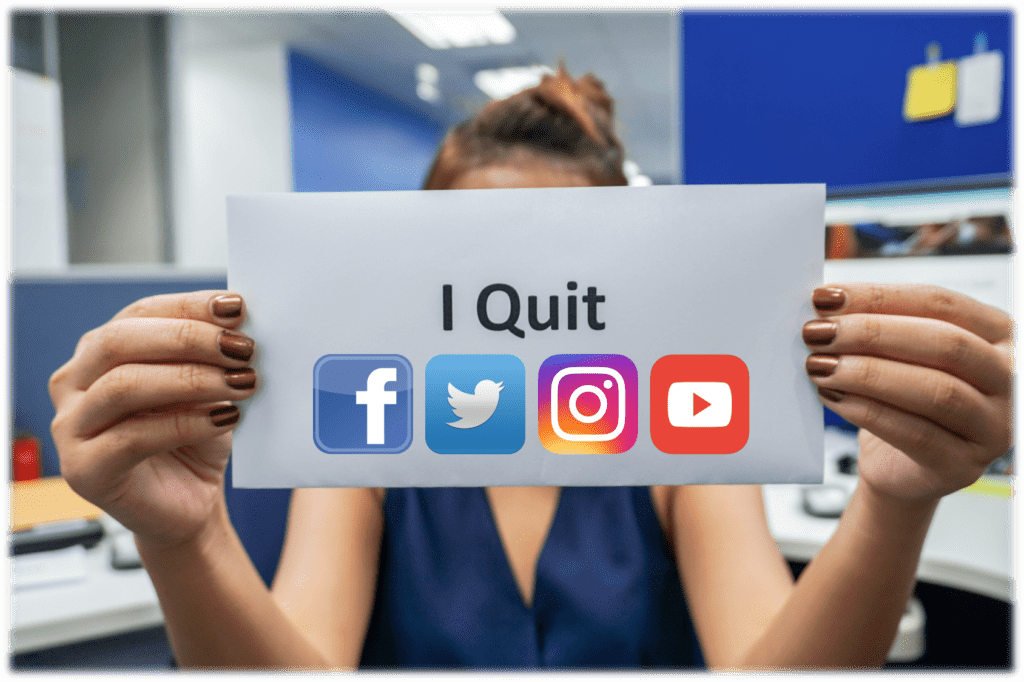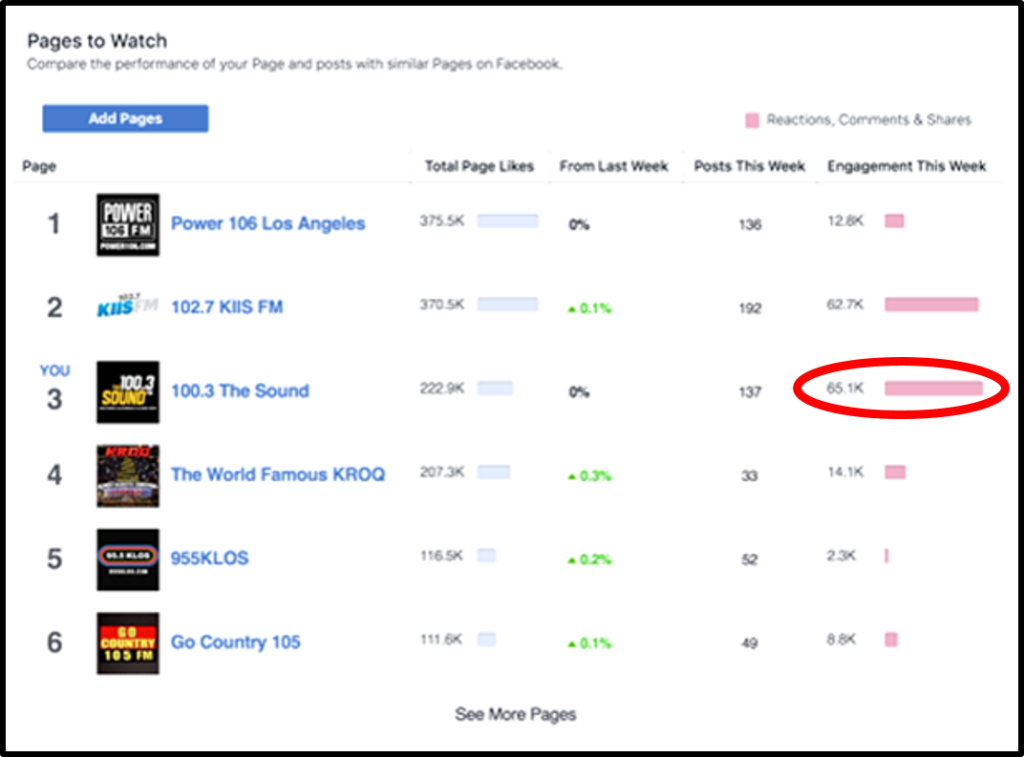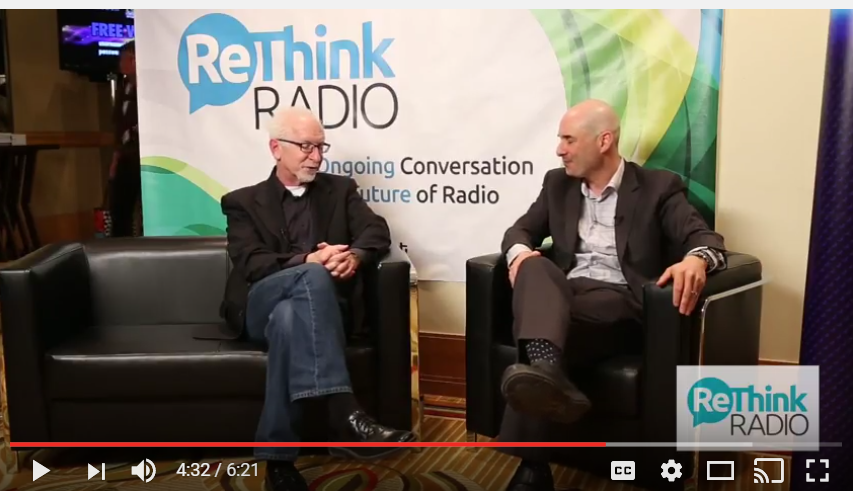 No, this post has nothing to do with aggregating “likes” and “followers.” And it’s not about monetizing social media. While there are many in radio attempting to achieve both of those goals , the true value of social media platforms has little to do with size or revenue. There are better social yardsticks, but they’re not always simple to get our heads around.
No, this post has nothing to do with aggregating “likes” and “followers.” And it’s not about monetizing social media. While there are many in radio attempting to achieve both of those goals , the true value of social media platforms has little to do with size or revenue. There are better social yardsticks, but they’re not always simple to get our heads around.
Social media has been with us now for more than a decade, but continues to be misunderstood and misused. Many of you know that I am active on Facebook and Twitter, and despite years of “practice” in the space, I still often find it a struggle. Part of that is due to the changing dynamics on the part of the Facebook team, constantly tweaking their algorithm and their overall business practices.
And part of it is also due to the billions of us who now regularly use these social networks. We continue to change the game by pushing the boundaries and creating new paradigms. Whether it’s 7 year-olds starting their own YouTube channels, Facebook trying to cope with “fake news,” or the news media trying to figure out what Donald Trump is doing on Twitter, there is something strangely fluid and organic about the ways in which social is changing and morphing over time.
These past few months have been rough on many people in the social space. Many people are angry and untethered, especially when they’re spouting off socially. I’ve seen more vitriol during this political cycles – on both sides of the aisle. I know that many of you have unfriended, hid, or blocked people who you once considered friends and colleagues. Then there are the trolls, the shit-stirrers, and the commenters who use the open spaces to circumvent, distort, and warp a post. While many of us once enjoyed reading reactions from the audience, it’s become increasingly more difficult to scroll down these days.
So I was taken by a recent point/counterpoint argument in The New York Times’ “Preoccupation” column. The opening salvo was fired last month by Cal Newport in his piece, “Quit Social Media. Your Life May Depend On It.” Claiming to have always been off the social media grid, Newport believes that posting is a low-value activity, and that networking and brand-building can be done without the benefit of these platforms.
He also sees social as a waste of time, a sentiment I’ve also heard from more than a few radio people. Newport’s premise is that true impact is accomplished by hard work, not by trying to get your post, photo, or meme to go viral.
A couple weeks later, a response came from Patrick Gillooly in the same column. His missive is titled “Don’t Quit Social Media. Put It To Work For Your Career Instead.” It turns out Gillooly is a social media specialist, so you’d expect him to defend the space. He argues that the social discussion is important, so much so that the Presidential election was at least indirectly impacted by the socialsphere. And he points out that news is being made on social media – it has become an integral way to understand what’s happening.
I considered both arguments as part of an interesting discussion of a true phenomenon of our time. We have been forever altered by social media, whether we’re on it and active like Gillooly, or insulated from it like Newport.
And in thinking about what social media truly means to the radio business, it’s not hard to identify several important uses of the space that can truly contribute to our careers and the brands we’re paid to manage and grow, if we take the time to learn and embrace it.
So here’s my top six reasons why social is essential to our industry, while also helping us improve our brands and our personal performance:
1. Social media helps us value prospective employees
Now we’ve come a long way from the days when seeing a college student drinking a beer on Facebook turned out to be a career non-starter. Social media has matured – and more importantly, so have we. Reasonably intelligent people know what to post…and what not to.
In many ways, social media is a window into the soul and character of many of us. In trying to understand what a potential new hire is all about, our companies use social media extensively to learn more about how applicants manage their own brands, what’s important to them, and how they see and present themselves, their friends, and their families.
You won’t learn everything about a job candidate from conducting a sweep of social media channels, but you’ll often get more truth than what you’ll read on a resume or even hear parroted back to you in an interview. Social is a way of researching the candidate. Chances are good it will help you develop some important questions you’ll want to ask if and when that interview happens.
2. Social media is show prep
Sure, it’s important to read your local paper in print or online. And those prep services can be very helpful and time-saving as well.
But if you want to get a flavor of what real people – yes, your audience – are thinking about, spending 20 minutes on your newsfeed every morning can really help shape your show’s flavor, while better connecting you with the emotional state of regular folks – not publicists, publishers, or pundits.
The best radio shows reflect the vibe, attitude, and zeitgeist of their audiences – the ones filling out the diaries and carrying the meters. Donald Trump figured that out and tapped into it. By studying what people are saying, posting, and doing on social media, you can get much closer to the pulse of your audience.
It can also put you in touch with news stories and articles that are connecting with these same people. If your cume is watching that video, chances are you should be, too.
3. Social media is an amplifier.
Assuming you have something to say or show, there is no better way for your station or your show to share it with thousands – or even millions – of people. The ability to drive communities and tribes back to your website or your air is something that just didn’t exist before social media became part of our digital DNA.
How you create your content and manage its distribution is part of the art and craft of using social media. But better than billboards or direct mail, a great piece of content can make you a star. At least for a day.
And if you play it really smart, you can use that content to drive audiences back to your show, your web page, your app, or your podcast. It used to be that program directors and air talent were pretty much dependent on management or ownership to help get the word out.
Today, anyone on any station can use social media as that viral Marshall Stack to reach mass audiences, assuming the message or the event is compelling enough. Imagine how much bigter Orson Welles’ “War Of The Worlds” or Steve Dahl’s “Disco Demolition” would have been in the age of Facebook and Twitter.
4. Social media gives your audience a voice
You may not always like what they have to say, but social has clearly flipped the funnel. For decades, no one in radio really had to pay much attention to listeners. After all, they had no way to truly express themselves, short of the request line, a letter to the station, or by simply turning the station off.
Today, the audience has its own megaphone. And when you do or say something they don’t like, you hear about it. Part of the challenge for any programmer or jock is to assess what it all means in the harsh light of day.
In many ways, your legions of listeners having their own mic not only empowers them, but it keeps you honest. The need for more authenticity and transparency grows with each passing year.
Social has made it more difficult to “disappear” DJs and then not be accountable for the decision. It has made it more challenging when an air talent or show makes that critical mistake. It used to simply go away in the ether. Not anymore.
Social also also makes it easier to respect an audience that we would only see at events and personal appearances. Our listeners now have a face, they have a voice, and they want to be acknowledged, appreciated, and recognized. Social makes it easy for radio to do that, often making their day with just a click of a mouse and as few cheery comments.
5. Social engagement earns you cred
I can’t be running around out there, speaking at conferences and working with media brands in the digital space without some bona fides – this blog, our podcasts, and of course, social media activity all contribute. It’s not about how many followers you or I have on Twitter – it’s what we do with the posts we write and the content we create.
Similarly for brands, success in the social space can open doors. My client in Los Angeles, Entercom’s KSWD, is a case in point. They’ve worked hard at their Facebook engagement, so much so that despite being a standalone station in a highly competitive market, the station’s Facebook metrics are pretty damn impressive.
The chart below shows you where they rank in overall page views – #3 behind juggernauts Power 106 and KIIS-FM. And note that when it comes to engagement, they’re ahead of the entire radio pack.

What’s the point?
These stats are entry points to conversations with advertisers and marketers about branding, selling, and overall effectiveness in a media world that is highly disruptive and very confusing. KSWD’s numerical leadership role gives them the credibility and social chops to have those conversations, and to work with advertisers and local businesses on integrated strategies. They may just be metrics, but they’re meaningful, and they open the doors to doing more business with advertisers increasingly skeptical of broadcast media.
6. Social can help you understand what you’re getting into
OK, so maybe this last one is more about me than you. But as the world has gotten smaller, I regularly hear from more and more people wanting to connect and partner with us. A little “research” on social media can tell me a lot about you, what you do, and whether you’re good at it.
Pretty much everyone who engages us – as a potential client or collaborator – gets checked out socially. You’d be surprised how many people who claim to be the real deal are essentially inactive in social media. Now that doesn’t disqualify them, but it does tell you a little something about who they are and how they’ve chosen not to market their brands or themselves.
 As you may know, we are involved with many conferences. Oftentimes, we’re tasked with putting together panels or entire agendas for events like DASH, Jacobs Summits, or at conferences like Canadian Music Week, Podcast Movement, or The Radio Show. A website and online articles can tell me something about a person. But a YouTube video (and yes, YouTube is a social network) often shows you all you need to know about how professionals present themselves, hold an audience, and put together a session.
As you may know, we are involved with many conferences. Oftentimes, we’re tasked with putting together panels or entire agendas for events like DASH, Jacobs Summits, or at conferences like Canadian Music Week, Podcast Movement, or The Radio Show. A website and online articles can tell me something about a person. But a YouTube video (and yes, YouTube is a social network) often shows you all you need to know about how professionals present themselves, hold an audience, and put together a session.
I also use it when I’m booked for an appearance and want to know a little something about the speaker or panelists who will appear before and after me. “Batting order” is important. And while I may not alter my presentation because of who precedes or follows me, a little social media “research” helps give me context about the vibe of the room may be when it’s my turn on stage. Talk to anyone who regularly does public speaking gigs, and they’ll tell you the act you follow can be an important determinant in how you go over.
So quit social media? Or even diminish its importance?
Do so at your own risk. There are certain “givens” in our world of media and entertainment.
Social media is now one of them.
- Baby, Please Don’t Go - November 22, 2024
- Why Radio Needs To Stop Chasing The Puck - November 21, 2024
- Great Radio – In The Niche Of Time? - November 20, 2024




Radio is word of mouth. Social starts with word of….word. And, certainly includes audio/video from “forward” or your own creation. Big lesson from BIA Kelsey’s Digital Advertising Boston confab: Make the connection with Broadcasting Simple! We’re fortunate to have our expressive new world of instant access, send and receive. Complaints or complements on Twitter & FB get faster attention. LinkedIn effectively links (although their automated billing makes erroneous over charges). Junk e-mail is a time drain. But, curation takes time and you’re very correct, it’s all show prep. Remember lessons learned from all media, radio, newspaper and Morse Code: the content and presentation has to be there to connect. Thank you Fred! Clark, Boston. http://www.broadcastideas.com
Thanks for the comment, Clark.
if more radio stations used social media to recruit brand ambassadors, they’d find online stars and have better web content…why? cause it comes from the audience. From mom bloggers, to music reviewer to sports ranters…fans are the passion that drive ratings…give them a digital voice, vet them properly and you just may end up with your best new on air star!
True that, Michael. Our most passionate fans are in our social tribes. Tapping into them, acknowledging them, and serving them is a key to realizing their value. Thanks for chiming in.
Great post. Now a days every business, even every platform needs social media to connect, grow and spread the word/message. And after all its a good thing where actually you gets a chance to connect with your real audience, share your thoughts and come up with a new ideas. It all depends.
Mitch, thanks for the comment. I see that upside in social media as well. Appreciate you reading our blog and commenting.